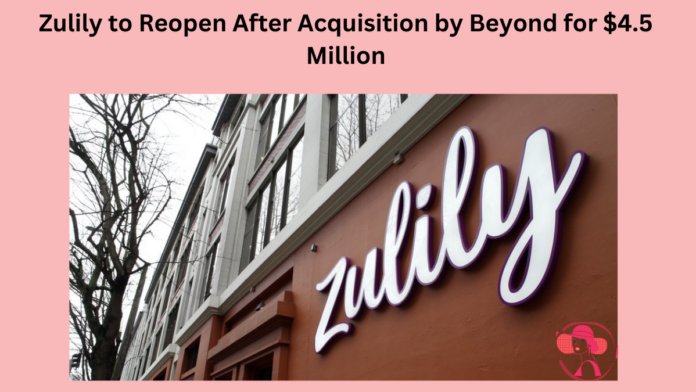Zulily closing hit hard for many, especially those who once helped build the brand into a retail powerhouse. The Seattle-based online retailer, which specialized in flash sales and daily deals for moms, was once a game-changer in e-commerce. However, its decline was marked by loss of identity and challenges keeping up with competitors.
Now, Zulily is poised to make a comeback after being acquired for $4.5 million by Beyond. This article dives into Zulily closing journey, what led to its downfall, and the potential future it holds under new ownership.
The Rise of Zulily: A Perfect Storm of Innovation
At its peak, Zulily was one of Seattle’s fastest-growing tech companies. By offering limited-time deals for moms and their kids, it created an exciting shopping experience. It wasn’t just shopping—it was an event.
- Target Market: Moms and their kids
- Business Model: Daily deals and flash sales
- Unique Selling Point: Selling products before ordering them from vendors
Key Milestones in Zulily’s Early Success:
| Year | Revenue | Active Customers |
|---|---|---|
| 2011 | $143 million | 830,000 customers |
| 2012 | $331 million | 1.58 million customers |
| 2013 | $1 billion+ | Continued growth |
Zulily’s ability to connect smaller vendors to large audiences through its unique fulfilment strategy gave it a competitive edge. Customers loved the personalized shopping experience and the thrill of finding something special every day.
Challenges Begin: A Mismatch of Strategies
Despite its early success, Zulily’s growth started to slow. Several factors contributed to this, including the rise of competitors like Amazon and Nordstrom, the long wait times for product delivery, and a shift away from its core customer base.
In 2015, Zulily was acquired by QVC parent Qurate Retail Group for $2.4 billion. While this acquisition seemed like a positive move, it quickly became clear that the two companies had different goals.
- Zulily Focus: Younger moms shopping on smartphones
- QVC Focus: Older customers shopping on TV
The difference in merchandising models also created friction, with QVC focused on traditional retail while Zulily tried to maintain its flash-sale appeal.
Key Issues Post-Acquisition:
- Cultural Misalignment: Different views on business management
- Customer Base Shift: Expanded product lines that diluted the brand
- Slower Growth: Flat revenue and customer count post-2015
Zulily’s Decline: Struggling to Keep Up
Despite efforts to reinvent itself, Zulily continued to face difficulties. The pandemic initially brought a surge in online shopping, but this boost was short-lived. Zulily struggled to maintain its relevance in a competitive e-commerce landscape dominated by companies like Amazon and emerging players like Shien and Temu.
- 2021 Revenue: Down by 11% year-over-year
- 2022 Revenue: Plummeted by 38%
In 2021, Apple’s iOS privacy changes, which affected Facebook ads, severely impacted Zulily’s marketing efforts. The cost of acquiring new customers skyrocketed, leading to even more challenges in maintaining profitability.
The Acquisition by Regent and Beyond
In May 2023, Regent, a private equity firm known for acquiring distressed companies, purchased Zulily. Regent planned to expand Zulily into new markets, but the rapid decline of the business under its ownership came as a shock.
More than 800 employees lost their jobs, and vendors complained about unpaid invoices. This led many to question Regent’s management strategies.
However, hope emerged when Beyond acquired Zulily for $4.5 million, marking a new chapter for the brand. Beyond has yet to outline its plans, but employees and vendors are cautiously optimistic about the future.
Lessons from Zulily Closing
Zulily closing story serves as a cautionary tale for many businesses. Its downfall wasn’t the result of one competitor or acquisition—it was a series of missteps that eroded its brand identity and weakened its competitive advantage.
Key Takeaways:
- Maintain Brand Identity: Stick to your core values and target market.
- Operational Agility: Adapting quickly to market changes is crucial for long-term success.
- Effective Leadership: A clear and unified vision from leadership is vital, especially post-acquisition.
Conclusion: A New Chapter for Zulily
As Zulily begins its next phase under Beyond’s ownership, there’s an opportunity to regain its former glory. With the right strategy, Zulily could once again become a beloved brand for its target audience. The future holds challenges, but with careful planning and a renewed focus on its strengths, Zulily might just make its way back to the top.
Looking Ahead:
- Potential New Markets: Expansion could bring Zulily into previously untapped regions.
- Rebuilding Trust: Customers and vendors will need to see consistent improvements to regain their trust in the brand.
- Innovation: Leveraging technology and personalization will be key to staying relevant in the competitive e-commerce space.
FAQs:
- What led to Zulily’s downfall? Zulily’s struggles began with a shift away from its core customer base, cultural misalignment after its acquisition, and competition from giants like Amazon.
- What is the future for Zulily under Beyond? While details are still emerging, Beyond’s acquisition offers a new opportunity for growth and brand revitalization.
- Will Zulily’s business model change? It’s too early to say, but Beyond may focus on Zulily’s original strengths: flash sales and unique products for moms and kids.













